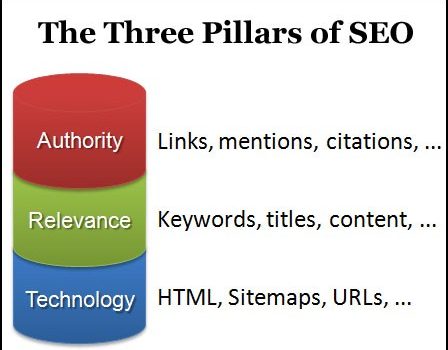
Focusing on these three pillars of SEO will increase your content opportunities and drive more organic traffic over time.
1) Authority:
In SEO, authority refers to the importance given to a page in relation to a given search term. Modern search engines such as Google use many factors when evaluating the authority of a web page.
Why does Google care about page authority? For most queries, there are thousands or even millions of pages available to rank.
Google wants to rank in the top sites that are most likely to satisfy the user with accurate, reliable information that fully meets the purpose of the request.
Google cares about providing users with the most authoritative pages for their queries because users who are satisfied with the pages they go to from Google are more likely to use Google again and thus have more access to Google ads, their main source of income.
2) Relevance:
You must be relevant to the given topic.
Think of each page visit as a meeting on a dating app. Will users “swipe right” (thinking, “That looks like a good match!)?” If you have a page about Tupperware, it doesn’t matter how many links you get – you’ll never rank for queries related to used cars.
This defines the limitation of link strength as a ranking factor and shows how relevancy also affects the value of a link. Consider a page on a website that sells a used Ford Mustang. Imagine he gets a link from Car and Driver magazine. This link is very relevant. Also, think about it intuitively. Is it likely that Car and Driver magazine has experience with the Ford Mustang? Certainly.
Instead, imagine linking to this Ford Mustang from a site that usually writes about sports. Is the link still useful? Maybe, but not as helpful because Google has less evidence that the sports site is good at using Ford Mustangs.
In short, the relevance of the referring page and the referring site affects how valuable a link can be considered.
3) Experience:
As we saw above, Google started by focusing on ranking pages for authority and then finding ways to evaluate relevancy. The third evolution of search was user experience evaluation.
Many SEOs prefer to talk about SEO not as search engine optimization, but as search engine optimization. Google realized that authority and relevance, as important as they were, weren’t the only things users were looking for when they searched. Users also want the pages and sites that Google sends them to be user-friendly.
What is a “good user experience”? It includes at least the following:
– The content on the landing page is highly relevant to the user’s query.
– The page that the crawler lands on is what it expects to see, given its query. Without bait and switching.
– Content sufficient to answer the purpose of the user’s query, as well as links to other relevant sources and related topics.
– The page loads quickly, relevant content becomes immediately apparent, and page elements quickly fall into place (all aspects of the Google Page Experience Update).
via searchenginejournal.com

 Get in Touch
Get in Touch 


